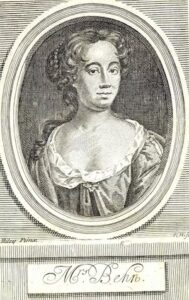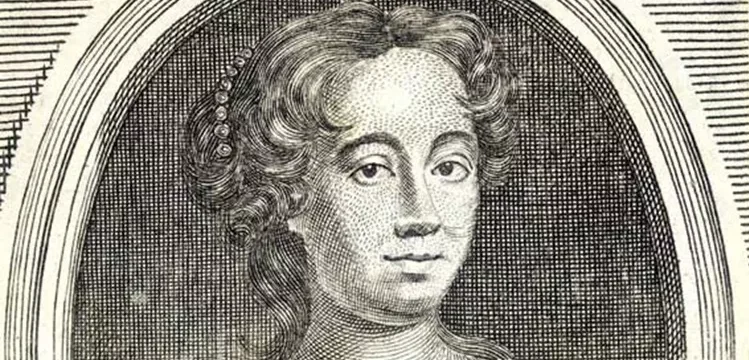 BEHN EN MOUVEMENT /BEHN ON THE MOVE
BEHN EN MOUVEMENT /BEHN ON THE MOVE
In Paris (Sorbonne Université – Université Sorbonne Nouvelle – Université Paris Cité)
(Scroll down for English version)
Date et lieu : 19-20 juin 2025, Paris, France
Conférencièrs plénières : Claire BOWDITCH, Loughborough University, GB, Elaine HOBBY, Loughborough University, GB, Leah ORR, University of Louisiana, US
Alors que la ville de Canterbury s’apprête à ériger une statue en son honneur et que voit le jour une nouvelle édition des œuvres complètes d’Aphra Behn, le moment paraît propice pour réinterroger la place de Behn et de son œuvre dans la critique et dans l’imaginaire collectif. À l’opposé d’une Behn statique, loyale à un imaginaire Tory conservateur, ce colloque propose ainsi de placer la réflexion sous le signe du mouvement, de la mobilité, du décentrement et de l’innovation.
Aventure ou fuite, la mobilité est chez elle d’abord spatiale. Parmi ses pièces les plus célèbres, The Rover (1677) porte le mouvement et l’errance dès son titre : le héros est un royaliste exilé, sans lieu, mobile par contrainte autant que par choix. Nombre de pièces et de romans invitent le spectateur à déplacer le regard vers l’ailleurs, à envisager d’autres espaces : l’Espagne et l’Afrique avec Abdelazer (1676), les Pays Bas avec The Dutch Lover (1673) et The History of the Nun (1689), le Nouveau Monde avec Oroonoko (1688) et The Widow Ranter (1690), voire la Lune et le cosmos avec The Emperor of the Moon (1687) et A Discovery of New Worlds (1688), sa traduction du best-seller de Fontenelle. Si cet ailleurs fantasmé permet surtout, en dernière instance, la critique d’un ici, Behn fut elle-même une grande voyageuse, de la France et des Flandres au Surinam. Ce même goût du décentrement, linguistique autant que géographique, anime son activité intense de traductrice et d’autrice.
Dans son œuvre, la mobilité spatiale va volontiers de pair avec une mobilité sociale. La sortie de son lieu, l’excursion (parfois temporaire) hors de sa condition économique et sociale, voire sexuelle, sont des thèmes très présents chez Behn, du personnage du parvenu à celui du commerçant colonial – même si ces personnages ne sont pas toujours dépeints avec indulgence. On pense par exemple à Angellica Bianca, charismatique courtisane qui, rendue folle de rage par le dépit amoureux, en vient à tenir en joue son amant dans The Rover, à l’opposé des idéaux féminins de modestie et de contrôle de soi ; ou à Oroonoko, prince africain arraché à son Afrique natale pour être réduit en esclavage au Surinam. Behn elle-même semble avoir été le produit de cette mobilité, de son Kent natal à son intégration au monde social et économique très masculin du Londres littéraire et du milieu interlope du théâtre.
La complexité générique et formelle des textes et les multiples influences dont ils témoignent se traduisent enfin par une mobilité des textes eux-mêmes, qui font une large place à l’hybridité et à l’inventivité thématique et formelle. Les questions de la représentation, de l’innovation générique et de la dramaturgie sont ici centrales à la réflexion. Pour le théâtre, on pourra s’intéresser à l’art de l’acteur et de l’actrice ainsi qu’aux innovations plus formelles – variations sur la figure du « rake », réflexion sur l’agentivité féminine, travail sur la vitesse, l’intonation ou le rythme… – ou techniques : décors coulissants pour ménager les révélations, expérimentations sur les scènes de groupe et les déplacements… Dans la fiction, l’hybridité générique permet à Behn d’emprunter au genre épistolaire, à l’écriture historique, à la fiction galante (ou au prosimètre à la mode en France) pour créer des narrations complexes à la voix narrative instable et souvent ambiguë.
Ce colloque accueillera toutes propositions (de préférence en anglais) sur la question du mouvement et de la mobilité, ainsi que des aspects novateurs de l’écriture de Behn, en particulier poétique, théâtrale ou romanesque. Ces propositions pourront aborder, sans s’y limiter, les questions suivantes :
- représentation des mobilités géographiques et spatiales, y compris de l’errance et des mobilités forcées ; représentations de l’ailleurs, entre autres l’ailleurs impérial et la société coloniale ; représentation du commerce international et de la diplomatie, représentations du voyage, de la claustration, de la mobilité impossible ;
- innovations de Behn par rapport aux traditions théâtrales et romanesques dont elle s’inspire ; phénomènes d’hybridité générique ;
- conservatisme et innovation dans les représentations genrées ; transgressions et audaces dans les représentations des sexualités, de l’amour et du mariage ; la question de la transformation de soi et de la métamorphose ;
- affirmation et hésitations de Behn dans sa construction d’une persona publique d’autrice, dans ses positionnements politiques ;
- questions de la mobilité sociale et de ses limites ;
- représentation de nouveaux objets comme la science et la curiosité ;
- innovations dans les techniques dramatiques ; part donnée au chant et à la danse dans le spectacle ; gestuelle et la technique de l’acteur et de l’actrice ; modernisation de la diction…
- Behn, la France, les Pays bas et la question de la mobilité linguistique ;
- du côté de la réception, la question de la « modernité » de Behn dans les mises en scènes contemporaines, notamment son « féminisme » ;
- innovations et nouvelles perspectives dans les Behn studies ; l’apport des études textuelles, des nouvelles archives, etc.
Afin d’allier théorie et pratique, le colloque sera accompagné d’une intervention théâtrale, proposée par les étudiant.e.s.
Comité d’organisation : Line COTTEGNIES, Sorbonne Université, Aurélie GRIFFIN, Sorbonne Nouvelle, Clara MANCO, Université Paris Cité
(Colloque soutenu par l’UR 4398 PRISMES, l’UMR 8225 LARCA, l’UR 4085 VALE et l’Initiative Théâtre de Sorbonne Université)
Les propositions (300 mots), accompagnées de courtes bio-bibliographies, sont à envoyer avant le 15 septembre 2024 à : line.cottegnies@sorbonne-universite.fr, aurelie.griffin@sorbonne-nouvelle.fr, clara.manco@u-paris.fr.
____
English version
Date and Location: 19-20 June 2025, Paris, France
Keynote Speakers: Claire BOWDITCH, Loughborough University, UK, Elaine HOBBY, Loughborough University, UK, Leah ORR, University of Louisiana, USA
With a new edition of Aphra Behn’s works on the go, and as Canterbury prepares to erect a statue in her honour, the moment seems ideal to re-examine Behn’s place and her work in criticism and in the collective imagination. Challenging the image of Behn as loyal to a conservative Tory imagination, this conference aims to emphasize movement, mobility, decentering, and innovation in her oeuvre.
Whether through adventure or escape, mobility is first and foremost spatial in Behn’s works, as in her own life. One of her most famous plays, The Rover (1677), signals movement and wandering from its very title: the hero, an exiled royalist, is mobile by necessity as well as choice. Many plays and novels invite the audience to shift their gaze elsewhere, to consider other spaces: Spain and Africa with Abdelazer (1676), the Netherlands with The Dutch Lover (1673) and The History of the Nun (1689), the New World with Oroonoko (1688) and The Widow Ranter (1690), or even the Moon and the cosmos with The Emperor of the Moon (1687) and A Discovery of New Worlds (1688), her translation of Fontenelle’s bestseller. Imagined distant lands often offer the author an opportunity to critique her home country, yet Behn herself was also a great traveller, moving from France and Flanders to Surinam. This taste for linguistic and geographical de-centering fuels her intense activity as a translator and author.
In her works, spatial mobility often goes hand in hand with social mobility. Many of Behn’s characters step out of their initial place, whether in an economic, social or even sexual capacity – albeit temporarily in some cases. Socially mobile characters ranging from upstarts to colonial merchants abound in her works, even if these characters are not always depicted favourably. For example, Angellica Bianca is a charismatic courtesan who, driven mad by jealous rage, holds her lover at gunpoint in The Rover, denying feminine ideals of modesty and self-control; Oroonoko, an African prince, is torn from his native Africa to be enslaved in Surinam. Behn herself seems to have been a product of this mobility, from her native Kent to the very masculine social and economic world of London’s literary and theatrical scene.
The hybridity and thematic inventiveness of her works also contribute to their generic and formal complexity. Questions of representation, generic innovation, and dramaturgy are central to this discussion. On stage, one might consider the art of the actor and actress as well as innovations that can be either formal – variations on the figure of the rake, reflections on female agency, questions of speed and rhythm… – or technical – with the use of sliding scenery for revelations, or experiments on group scenes, blocking and movements… In fiction, Behn’s works are also hybrid as they borrow from letter-writing, history, gallant fiction (or the prosimetrum that was then fashionable in France) to create complex narratives with an unstable and often ambiguous narrative voice.
This conference will welcome proposals (in English) on the question of movement and mobility, as well as on the innovative aspects of Behn’s writing – particularly in poetry, drama, and novels. These proposals may address, but are not limited to, the following questions:
- Representation of geographical and spatial mobilities, including wandering and forced mobilities; representations of distant lands, including the imperial other and colonial society; representations of international trade and diplomacy, representations of travel, confinement, of an impossible mobility;
- Behn’s innovations compared to the theatrical and novelistic traditions she draws from; phenomena of generic hybridity;
- Conservatism and innovation in gender representation; transgressions and boldness in representations of sexuality, love, and marriage; questions of self-fashioning and metamorphosis;
- Behn’s assertion and hesitations in the construction of a public authorial persona and in political alignment;
- Questions of social mobility and its limits;
- Representation of “new” subjects such as science and curiosity;
- Innovations in dramatic techniques; the role of song and dance in performance; the body language, blocking and stage business of actors; the modernization of diction;
- Behn, France, the Low Countries, and the question of linguistic mobility;
- Regarding reception, the question of Behn’s “modernity” in contemporary productions, particularly her “feminism”;
- Innovations and new perspectives in Behn studies; the contribution of textual studies, new archives, etc.
To combine theory and practice, the conference will be accompanied by a theatrical intervention proposed by students.
(The conference is funded by the following research centres : UR 4398 PRISMES at Université Sorbonne Nouvelle, l’UMR 8225 LARCA at Université Paris Cité, UR 4085 VALE and Initiative Théâtre at Sorbonne Université)
Organized by: Line COTTEGNIES, Sorbonne Université, Aurélie GRIFFIN, Sorbonne Nouvelle, Clara MANCO, Université Paris Cité
Abstracts (300 words), accompanied by short bios, should be sent before September 15, 2024, to:line.cottegnies@sorbonne-universite.fr, aurelie.griffin@sorbonne-nouvelle.fr, clara.manco@u-paris.fr.


